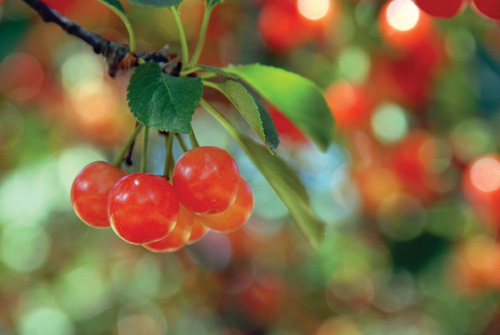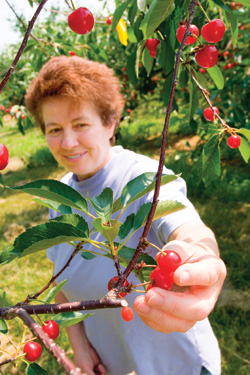
Features
Production
Research
Cherry industry trying to broaden the appeal of tart cherries
trying to broaden the appeal of tart cherries
March 17, 2008 By Fruit & Vegetable
The very mention of tart
cherries can evoke pleasant thoughts – grandma in her apron, lifting a
freshly baked pie from the oven on a long-ago summer day – back when
calories and trans fats didn’t seem to matter.
 The very mention of tart cherries can evoke pleasant thoughts – grandma in her apron, lifting a freshly baked pie from the oven on a long-ago summer day – back when calories and trans fats didn’t seem to matter.
The very mention of tart cherries can evoke pleasant thoughts – grandma in her apron, lifting a freshly baked pie from the oven on a long-ago summer day – back when calories and trans fats didn’t seem to matter.
They do now, of course. So the grower-funded U.S. Cherry Marketing
Institute is kicking off a campaign to broaden the appeal of tart cherries by transforming their reputation. No longer are they a mere ingredient in fattening desserts. Now they’re a “superfruit” – bursting with antioxidants that may ease pain from arthritis and gout while helping ward off heart disease and cancer.
 |
| The U.S. Cherry Marketing Institute hopes to encourage consumers to reach for tart cherries through a new advertising campaign aimed at transforming their reputation to that of a fruit bursting with antioxidants that may ease pain from arthritis and gout while helping ward off heart disease and cancer. |
“In a sense, we’re re-introducing a fruit that we’re all familiar with,” said Phil Korson, the institute’s president.
Cherry sales have trended downward over the past decade because of changing consumer preferences, crop damage from bad weather and higher European tariffs.
Michigan produces about 75 per cent of America’s tart cherries, followed by Utah and Washington State. Canadian growers also are supporting the health-food initiative, which went public during the first full week of February.
The campaign’s director is Jeff Manning, a northern California marketing strategist and chief architect of the “Got Milk?” campaign, which some credit with single-handedly reversing a long slide in milk sales.
Manning plans a similar approach for tart cherries. Food image makeovers are his specialty – previous clients include producers of beef, raisins and those incredible, edible eggs.
“We’re going to try and light a fire under this idea of cherries as a superfruit,” he said.
But he’ll have to light it using less fuel than he’s used to. He had a $22-million annual budget as executive director of the California Milk Processor Board; now Manning will have $1.2 million raised by farmers from a one-cent levy on each pound of cherries harvested. Teaming with Weber Shandwick Worldwide, a Chicago public relations agency, he’s devised a plan for spreading the “superfruit” message.
They have helped the Cherry Marketing Institute overhaul its website – www.choosecherries.com – and design a new logo and slogan: “Cherries. Not Just Another Berry.’”
"We’ve tried to make this program, albeit on a smaller scale, as sophisticated as any food marketing program I’ve ever been associated with,” Manning said.
The publicity drive will include a summary of 65 studies of cherries’ health benefits, which Manning’s team will pitch to nutrition experts and fitness magazines. The industry is pumping $265,000 into further research through the University of Michigan’s alternative medicine unit.
These days, seemingly every agricultural commodity is
touted as a health food or “nutraceutical.” The cherry industry hopes to show tarts have anti-inflammatory properties that set them apart – even from other antioxidant-rich fruits such as
blueberries and cranberries.
“Tart cherries are absolutely one of the very healthy fruits,” said Russell Reiter of the University of Texas Health Science Center at San Antonio. His studies found cherries are rich in melatonin, a powerful inflammation inhibitor that can improve sleep. (The U.S. Food and Drug Administration has warned against labeling cherry products as cures for specific ailments, saying that hasn’t been clinically proven.)
The campaign will lobby processor trade groups to use cherries in more products, such as cereals, muffins and juice blends.
“There aren’t enough cherry trees in the ground to fill the demand we could produce,” Manning said.
Don Gregory, who farms about 525 hectares of cherry trees near Suttons Bay, hopes the campaign works. He recalls when growers got nearly twice the price that they’re getting these days for their crop.
“People are eating less dessert now than they ever have, so we’ve got to start promoting the health benefits,’’ Gregory said. “I started growing cherries more than 30 years ago and people back then were drinking cherry juice because they had gout or arthritis. It’s just taken the industry a while to catch up.”
Print this page